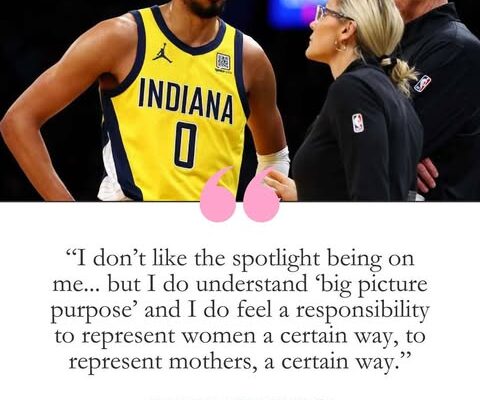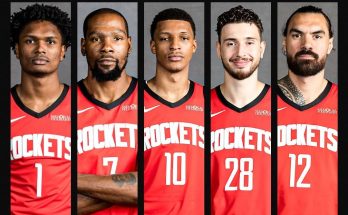The NBA Finals have always been a stage where the best of basketball converge—the culmination of a season’s worth of blood, sweat, and tears. It is the ultimate proving ground where legends are born, dynasties are built, and history is written. While the spotlight often shines on the players and head coaches who steer their teams through the grueling playoff gauntlet, it is essential to recognize the broader landscape of basketball leadership, which has often been slower to evolve. That is why Jenny Boucek’s historic role as the first female assistant coach in the NBA Finals deserves not just acknowledgment, but a resounding celebration.
For decades, professional basketball has been a male-dominated sport at every level, especially on the coaching sidelines. The NBA has long been seen as a league defined by tradition and, frankly, stubbornness when it comes to breaking barriers in coaching ranks. While women have made remarkable strides in basketball as players, referees, and executives, coaching on the NBA sidelines has remained one of the last frontiers. Jenny Boucek’s presence on the Indiana Pacers’ coaching staff in the NBA Finals represents a watershed moment — a breakthrough not just for her personally, but for the entire sport.
Jenny Boucek’s journey to this historic milestone is a testament to her passion, persistence, and profound basketball IQ. She did not arrive in the NBA as a novelty or a token figure; she earned her place through years of dedication and excellence. Boucek’s basketball roots run deep. She was a standout college player at the University of Washington, where she developed an intimate understanding of the game from both a technical and strategic standpoint. After her playing days, she transitioned into coaching, starting in women’s professional leagues before breaking into the NBA as a respected assistant coach.
Throughout her coaching career, Boucek has built a reputation for her meticulous approach to player development, especially working with big men and helping them refine their offensive and defensive skills. Her expertise has been sought after by several NBA teams, where she has contributed significantly to player growth and team strategies. Yet, despite her undeniable qualifications, her presence on an NBA Finals coaching staff is something that had not happened before—until now.
When the Indiana Pacers named Jenny Boucek as an assistant coach during their remarkable playoff run, it was a bold statement. It signaled the Pacers’ commitment to winning with the best minds regardless of gender and their recognition that talent and insight are what truly matter on the sidelines. Boucek’s role was not symbolic; she was actively involved in game planning, player mentoring, and real-time decision-making—functions that have a direct impact on the team’s performance and, ultimately, their success in the Finals.
Her presence in the NBA Finals sends a powerful message to aspiring coaches of all genders, particularly women, that the door to the highest levels of professional basketball coaching is no longer closed. For young women dreaming of a career in coaching, Jenny Boucek’s achievement is a beacon of hope and possibility. It demonstrates that with expertise, resilience, and the right opportunities, women can and should be part of the NBA’s coaching fabric.
Beyond the symbolism, Boucek’s impact in the Finals was tangible. Players and fellow coaches alike have praised her work ethic, strategic insights, and ability to connect with athletes. Her perspective brings a fresh dynamic to the coaching staff, contributing to the Pacers’ adaptability and depth. The NBA, known for its innovation on the court, now has an example of innovation in its coaching ranks, showing that diversity in thought and background leads to richer basketball strategies.
The significance of Boucek’s milestone also reflects a broader societal shift toward inclusion and equity in professional sports. The NBA has been a leader among major American sports leagues in promoting diversity, but coaching roles at the highest level have been slower to diversify. Jenny Boucek’s achievement underscores that progress is happening and that the barriers women face are being dismantled one step at a time. It challenges longstanding stereotypes about leadership in men’s professional sports and opens new conversations about what coaching looks like in the modern era.
Importantly, Jenny Boucek’s story is not just about breaking a gender barrier; it’s about excellence. She was chosen for this role because she is a remarkable coach whose insights help her team win. Her appointment and performance during the Finals prove that the inclusion of women in coaching positions enriches the sport. It is a win not only for gender equality but for basketball itself, showcasing how embracing diversity leads to better outcomes on the court.
Her presence also resonates deeply with fans. Basketball is a global sport with a broad, diverse audience, and seeing women in roles traditionally held by men inspires millions. It helps normalize the idea that coaching is about knowledge, leadership, and communication, not gender. This can influence younger generations to pursue coaching without hesitation, knowing their gender is not a limitation.
Furthermore, Jenny Boucek’s milestone contributes to the evolving narrative around women in sports leadership. While female athletes have long been celebrated, and female sports executives are making strides, coaching remains a particularly challenging arena to penetrate. Boucek’s success challenges this norm and adds to the growing list of women who are transforming sports leadership, paving the way for a more inclusive future.
In terms of the larger impact on the NBA and professional basketball, this achievement could inspire other teams to expand their coaching staffs to include more women. As teams seek every competitive edge in an increasingly analytical and fast-paced game, they are recognizing that talent and fresh perspectives are invaluable. Boucek’s presence in the Finals could be the catalyst for a broader shift toward gender diversity in NBA coaching across the league.
Historically, women have contributed significantly to basketball’s growth at the grassroots and collegiate levels, yet the NBA Finals coaching staff has been a barrier that seemed impenetrable. Jenny Boucek’s role breaks down this wall, and it will be remembered as a key moment in the NBA’s evolution. Just as the league once resisted integration and later embraced global talent, it is now stepping into a new era of inclusion where coaching roles are defined by skill, not gender.
The conversations that follow Boucek’s achievement should focus on how to sustain and build upon this progress. Opportunities for women in coaching must be expanded, and the NBA and other leagues should implement policies and programs that foster female coaching talent. Mentorship programs, coaching internships, and dedicated hiring initiatives can ensure that Boucek’s breakthrough is not an isolated incident but part of a larger movement.
In celebrating Jenny Boucek’s historic role in the NBA Finals, we honor not just a personal achievement but a collective victory for basketball. It reminds us that the game is bigger than just players on the court; it is about the communities it inspires, the cultures it shapes, and the possibilities it creates for everyone involved. Her story embodies the spirit of progress, perseverance, and the ongoing journey toward equality in sports.
As the NBA Finals fade from the headlines, Jenny Boucek’s name will remain etched in the history books as a trailblazer who changed the game’s coaching landscape forever. Her accomplishment challenges the status quo and invites the basketball world to dream bigger and aim higher when it comes to inclusivity. For all aspiring coaches, especially women, Jenny Boucek’s journey lights the way forward, proving that the NBA coaching sidelines belong to everyone with the passion and skill to lead.
In the years to come, the ripple effects of this milestone will grow stronger. More women will be inspired to pursue coaching, more teams will open their doors, and the NBA will continue to evolve as a league that truly represents the diversity and dynamism of the sport. Jenny Boucek’s achievement is not just history; it is the beginning of a new chapter—one where talent, respect, and opportunity know no gender.



